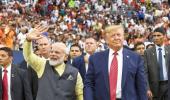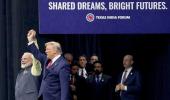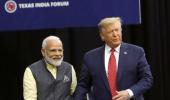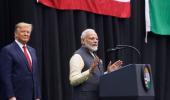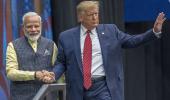'... to Imran Khan, that there's not going to be any mediation of any meaningful sort given his (Modi's) special relationship with Trump.'
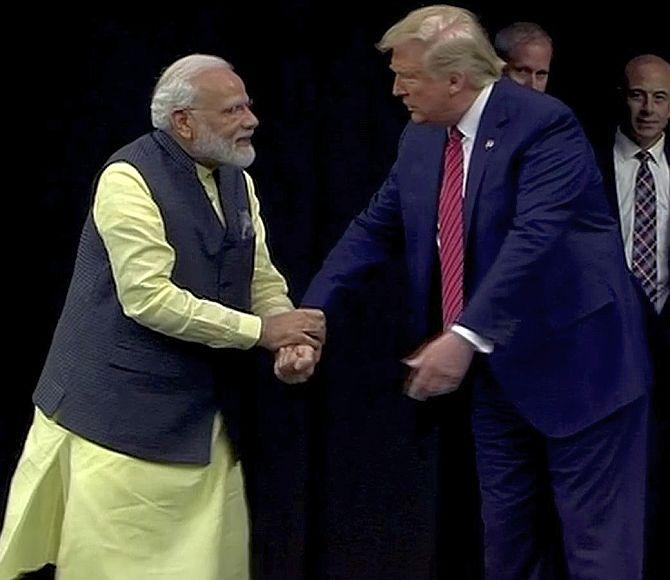
Dr Marshall M Bouton, president emeritus of the Chicago Council of Global Affairs, a global affairs think-tank, and presently acting director and visiting scholar at the University of Pennsylvania's Center for the Advanced Study of India, has devoted much more than half a century of his life to studying India.
Last weekend, when Prime Minister Narendra Damodardas Modi travelled to Houston to attend the Howdy Modi event, and, in spectacular style, shared the stage with US President Donald J Trump, Dr Bouton kept track of the developments with keen interest.
"Narendra Modi is committed to the US relationship. This is the hard truth behind Modi's theatre," Dr Bouton tells Rediff.com's Vaihayasi Pande Daniel in the first of a two part interview.
What was your summing up of the Modi-Trump event in Houston? How did Prime Minister Modi do?
I am just focusing on the Trump-Modi get together -- which, of course, shadows, everything now.
There were very few downsides for either guy. I think the greater upsides are for the prime minister.
It is quite brilliant, actually, that in one stroke, he (Modi) shores up the India-US relationship, with Trump and with the US.
It is a relationship, you know, that has been a bit bedeviled, it's been a bit in trouble over the last year. We have trade issues. What the president said after speaking with (Pakistan Prime Minister) Imran Khan, about being a mediator.
(Then before that) Modi invited Trump to be the Republic Day guest. Trump declined.
You know, it hasn't been that warm an embrace, either figuratively or literally.
This shores up (the India-US relationship) up, cements it and it augurs well for next year or two and if Trump continues.
Secondly, Modi sends a very clear message to the Pakistanis, to Imran Khan, that there's not going to be any mediation of any meaningful sort given his (Modi's) special relationship with Trump.
He also makes it clear to the Chinese that, you know, the US and India are as tight as they are reputed to be, to get an implicit validation of the Article 370 revocation (in Kashmir).
Perhaps most of all -- and this is the way clearly operating has been from the beginning -- Modi is a brilliant, great event guy, a great user of events.
Both men love rallies (laughs heartily).
Modi, in particular, uses events brilliantly. He comes to New York the first time in the September of 2014. He has this massive rally at Madison Square Garden. Right?
He uses personal diplomacy brilliantly and events figure very importantly in that.
So it is a natural for him. And it sends a message to his own supporters in India that he is what he claims to be -- that is a leader of India, who is respected around the world and especially in the great powers of the US and Japan and so forth. Not in China, of course, in the same way.
So it affirms their conviction about why Modi is a great leader for India. In the process, he also gets enormous uplift with the Indian-American community.
Now how many of them will now vote for Trump is another matter.
(He is also once again like on) previous visits encouraging American companies to invest in India.
Nevertheless, this is not what US companies need to make a decision to invest in India anymore. They are looking at the economy and the conditions for investment. So I don't think that's going to be the primary benefit to him.
And Trump?
There's a lot of upsides for both men. Not many downsides.
For sure, you know, Trump loves a good rally. Both (Modi and Trump) love the crowd. And he has done a rare thing in this instance. He has agreed to share the stage with somebody. He (Trump) was claiming before the event the reason they got 50,000 people was because he was coming.
Is he actually going to get more Indian Americans to vote for him than they did back in 2016? 78 per cent of Indian Americans are registered Democrats, those registered to vote. I don't think it's going to change too many votes, but it may change a few.
Perhaps more importantly, for Trump, he might be getting some financial support from Indian-American donors that he otherwise would not have gotten, given that some Indian-American donors who might have been inclined to support him in the past two or three years, may have doubted (doing so now) given the other things I've mentioned that were going on in the (India-US) relationship.
Mainly for Trump he gets to show that the country, that in his mind he is close to, that he is close pals with the leader of another major country.
During the 2016 campaign, India was the only country, only major country, that did not come in for criticism from Trump.
China, Japan, you know, all of the major European countries, all of them came in for major criticism by Trump. The Japanese are doing far better because (Japanese Prime Minister) Abe (Shinzo) is doing whatever Trump wants him to do.
But this way he gets to show that he's a great leader, right, by (being) associated with another person who's a great leader of a major country, you know, the largest democracy in the world, blah, blah, right?
The negatives?
On the downside, I was surprised by how far Modi went to offer a very strongly implicit endorsement of Trump's re-election. What was the phrase? Something like: This time a Trump government.
Now, it's artfully phrased so that you could read it as, well: Now, this time, there is a Trump government.
But what almost everybody read into it was: This time you should vote for a Trump government, saying to Americans, and Indian Americans, in particular.
That could really come back to haunt Modi obviously.
If the Democrats came back to power?
Exactly. It was a risk. But he's simply gambling that he can get away with that. Just as it was with (then US president George W) Bush and (then US president Barack) Obama, so as you know, (then prime minister) Manmohan Singh had become very close to Bush.
And then there was the (transition) to Obama. But Obama saw the importance -- after about a year -- of making nice with Modi. And so, you know, went out of his way to do so, including agreeing to go to the Republic Day parade.
It was something in particular that he wanted from Modi. Obama wanted Modi to sign onto the Paris Agreement (on climate change in November 2016). And he got that.
And for Trump, I don't think this is really going to translate into many votes come next year.
How important this event is going to turn out to be in the substance of the relationship over time? That I doubt.
It is one of those grand spectacles that a lot of politicians like to engage in and it does send a number of messages to key constituencies.
Beyond that, it is not going to change the objective reality of the relationship. That's my take.
You were talking about the downsides. Apart from it being a little risky for Modi to have sort of suggested that Trump should come back, it is also risky in terms of the message that he's giving off to Russia and China?
Oh, I don't think so.
I think the Russians have their own reasons to want to stay close to India. The Russians are already playing both sides of the street -- a little bit, more than a little bit, with India and Pakistan.
It is hardly a surprise to the Chinese. They all read it for what it is -- theatre.
Again, it doesn't change the objective realities. Will they say to themselves: Does this really bring the two countries that much closer together, objectively speaking? Probably the answers in their heads will probably be no. And I think they would mostly be right.
Trump has got another 16 months. Both Russia and China -- the Chinese in particular -- are waiting to see what happens next. They want to get rid of Trump. Putin probably has mixed feelings about that.
So I don't think either of them are going to be seriously moved by this whole (extravaganza).
You spoke about it being theatre. Modi kept calling it historic. The BBC called it a rare mass rally for a political leader and Indian media has been billing it as a one of the largest ever receptions for a foreign leader in the US after the Pope.
Do you think it was historic?
Honestly, no. It marks the fact that Modi was re-elected with an overwhelming (majority), with a landslide vote. And that's what Trump would love to have (laughing), sort of subconscious wish on his part, by going to this event with this guy who just won big, that he too can do that.
I personally don't really see it as historic. Was Obama's Republic Day visit historic? He was the whole afternoon sitting there with Modi. Was that historic? No. First time, an American president has ever been invited, or gone as a Republic Day chief guest.
Is this of comparable character? Probably, probably. Does it really change the reality of the relationship? Nah, not much.
This much we all know: Narendra Modi is committed to the US relationship. This is the hard truth behind Modi's theatre.
And it's a smart choice. Smart realiSation on his part. India has a huge stake in the Indo-US relationship. There's no denying it. There's no backing away from it.
It has to be managed skillfully, including managing it with different US presidents and different orientations to the relationship.
Modi is not going to in any way back away.
The various so-called setbacks in a relationship (like) the dropping of the GSP (Generalised System of Preferences, the US's trade preference programe). The US taking India to the WTO (World Trade Organisation) on a bunch of stuff. The mediation comment.
Modi has stayed very quiet, very calm, through all of that. I do think it is smart.
Previous Indian governments over-reacted to such activities, to those sorts of things. The fact is, that Trump has really not seriously punished India for the ongoing trade surplus it enjoys with the US. It might reduce, but not by much.
At the beginning, India came in for practically the same kind of treatment as China and other trade-surplus countries.
People will note this event for a long while, but I don't think it is historical. I don't think it is transformative of the relationship.
